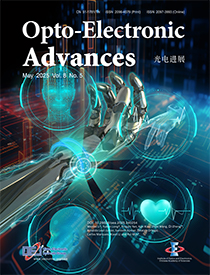Current Issue
2025 Vol. 8, No. 5
Cover story: Li WB, Long YK, Yan YY et al. Wearable photonic smart wristband for cardiorespiratory function assessment and biometricidentification. Opto-Electron Adv 8, 240254 (2025).
Cardiorespiratory function assessment and biometric identification have long been pivotal research areas in healthcare and information technology. With the continuous advancement of technology, these research fields are increasingly converging and innovating, bringing greater convenience and security to people's health and daily lives. Recently, Prof. Rui Min from Beijing Normal University, Prof. Di Zheng from Southwest Jiaotong University and collaborators, reported on a wearable smart photonic wristband based on all-polymer sensing units. This innovative smart photonic wristband integrates cardiorespiratory function assessment with biometric identification. Leveraging advanced optical technology, the wristband can monitor users' key physiological indicators such as respiratory rate, heart rate, and blood pressure in real-time, providing precise cardiorespiratory function evaluations. Additionally, it possesses biometric identification capabilities by recognizing the physiological characteristics of users' pulse signals, enabling efficient and secure identity verification. This smart photonic wristband not only enhances the convenience of personal health management but also offers users a safer and more personalized usage experience. This research provides new insights for the development of future smart wearable devices.

-
{{article.year}}, {{article.volume}}({{article.issue}}): {{article.fpage | processPage:article.lpage:6}}. doi: {{article.doi}}{{article.articleStateNameEn}}, Published online {{article.preferredDate | date:'dd MMMM yyyy'}}, doi: {{article.doi}}{{article.articleStateNameEn}}, Accepted Date {{article.acceptedDate | date:'dd MMMM yyyy'}}CSTR: {{article.cstr}}
-
{{article.year}}, {{article.volume}}({{article.issue}}): {{article.fpage | processPage:article.lpage:6}}. doi: {{article.doi}}{{article.articleStateNameEn}}, Published online {{article.preferredDate | date:'dd MMMM yyyy'}}, doi: {{article.doi}}{{article.articleStateNameEn}}, Accepted Date {{article.acceptedDate | date:'dd MMMM yyyy'}}CSTR: {{article.cstr}}

 E-mail Alert
E-mail Alert RSS
RSS


